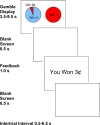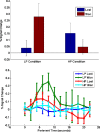Error effects in anterior cingulate cortex reverse when error likelihood is high
- PMID: 20203206
- PMCID: PMC2841347
- DOI: 10.1523/JNEUROSCI.4130-09.2010
Error effects in anterior cingulate cortex reverse when error likelihood is high
Abstract
Strong error-related activity in medial prefrontal cortex (mPFC) has been shown repeatedly with neuroimaging and event-related potential studies for the last several decades. Multiple theories have been proposed to account for error effects, including comparator models and conflict detection models, but the neural mechanisms that generate error signals remain in dispute. Typical studies use relatively low error rates, confounding the expectedness and the desirability of an error. Here we show with a gambling task and functional magnetic resonance imaging that when losses are more frequent than wins, the mPFC error effect disappears, and moreover, exhibits the opposite pattern by responding more strongly to unexpected wins than losses. These findings provide perspective on recent ERP studies and suggest that mPFC error effects result from a comparison between actual and expected outcomes.
Figures



References
-
- Alexander W, Brown J. A computational neural model of learned response-outcome predictions by anterior cingulate cortex. Soc Neurosci Abstr. 2008;34:682–21.
-
- Amador N, Schlag-Rey M, Schlag J. Reward-predicting and reward-detecting neuronal activity in the primate supplementary eye field. J Neurophysiol. 2000;84:2166–2170. - PubMed
-
- Barron G, Erev I. Small feedback-based decisions and their limited correspondence to description-based decisions. J Behav Decis Mak. 2003;16:215–233.
-
- Behrens TE, Woolrich MW, Walton ME, Rushworth MF. Learning the value of information in an uncertain world. Nat Neurosci. 2007;10:1214–1221. - PubMed
Publication types
MeSH terms
Grants and funding
LinkOut - more resources
Full Text Sources
